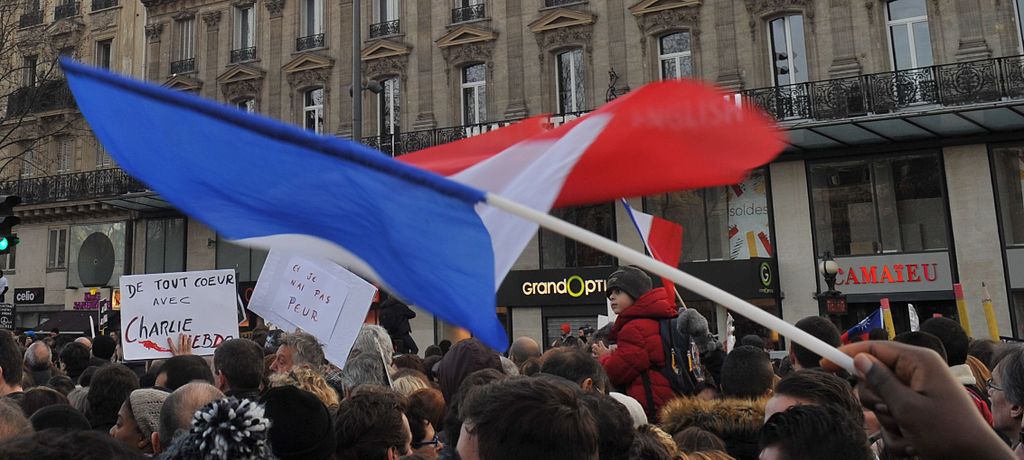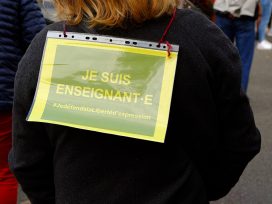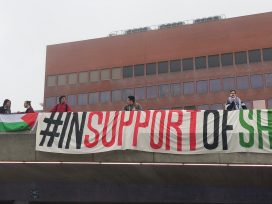Samuel Paty and the practice of public reason
The defence of democracy in France must continue to be a republican discourse, not one of libertarian nationalism. Critics of ‘Islamo-leftism’ engage in the very same process of blame-shifting that they accuse their opponents of – sometimes rightly.
Faced with Jihadist terrorism, we have two obligations that inevitably clash with one another. The first is to stand together and not give in to intimidation: to refuse to sacrifice the freedom of expression that terror seeks to destroy. Debates on the relevance of Charlie Hebdo’s cartoons and their use as teaching material cannot be held in the shadow of death threats. The preservation of freedom of speech requires unconditional solidarity with those who find themselves targeted. Their freedom of expression must be defended at all costs.
The Nice killings, which took place less than two weeks after the brutal murder of the schoolteacher Samuel Paty in Conflans-Sainte-Honorine, proved that the cartoons themselves are merely a pretext for terrorist violence. The genuine emotions aroused in Muslims by what they perceive as blasphemy are exploited by terrorists. In Nice, the victims of this inhuman crime were worshippers at a cathedral, even though the Catholic Church practises ecumenism and is particularly wary of caricatures that mock the sacred. For fundamentalists, however, representations of God in Christian art are just as blasphemous as the Charlie cartoons: they violate a religious taboo. Fanatics radicalize this logic, taking offence at anyone who does not share their vision of what religion should be.
In France, jihadist strategy pits Muslims against non-Muslims in reciprocal and radical hostility. The aim is to prevent Muslims from adhering to the principles of a secular society that would enable them to practice their faith in a tolerant fashion. Violence is necessary in order to persuade non-Muslims that Muslims should be treated not as fellow citizens but as potential enemies. Conversely, Muslims must be persuaded that, unless they join the jihadist camp, they are betraying Islam. Islamist politicians like Erdoğan promote this ultimatum when they attempt to capitalize on the outrage that the images inspire in the Muslim world. This forces Muslims who reject violence to express their support for France – the very country they are calling to boycott.
This leads us to the second obligation: to think politically, and therefore strategically, in order to thwart such a deliberate strategy. Democratic debate is one of the cornerstones of public reason. We cannot suppress our disagreements and confusions on the pretext that ‘public safety’ requires unanimity. Defending democracy from a terrorism that attacks the human right of free expression cannot consist in parroting phrases about the detrimental impact of individual rights on republican citizenship. Those who reproach ‘Islamo-leftism’ for exonerating Islamist extremism seem not to realize that they are engaging in the very same process of blame-shifting that they accuse their opponents of (sometimes rightly). The type of analysis that blames democracy for the emergence of anti-democratic actions leads nowhere.

Paris rally in support of the victims of the 2015 Charlie Hebdo shooting, 11 January 2015. Source: Wikimedia Commons
Drawing on his experience as a teacher, the philosopher Frédéric Ménager has pointed out the convergence of extreme relativism and authoritarian dogmatism in the claim: ‘You don’t have the right to challenge and insult my truth’. He notes that, faced with such an attitude, abstract appeals to ‘freedom of expression’ are powerless and may even suggest a defence of Dieudonné or Holocaust deniers.
The defence of the French Republic must continue to be a republican discourse, not one of libertarian nationalism. Freedom of expression is indispensable for the existence of the common space of democratic deliberation and the collective practice of public reason. What is being defended is not some imaginary right for everybody to utter any insanity they please, but everybody’s equal right to participate in collective deliberation, which requires freedom of speech, protection from violence, and non-discrimination.
Charlie Hebdo’s right to attack religion must be guaranteed unconditionally because it is equivalent to the right that religions have traditionally enjoyed to threaten ‘infidels’ with the punishments of hell. In the eighteenth century, the Enlightenment saw this as being at the core of fanaticism. Banning the Charlie cartoons should logically lead to censoring the sacred texts of the three monotheistic religions, since they are themselves full of offensive representations of non-believers and followers of other religions – representations that are accompanied by threats that have historically encouraged all kinds of violence.
Samuel Paty was murdered not for exercising his freedom of expression, but for making this freedom of expression a focus of his lessons, as the curriculum demanded. He was killed for doing his job – a job that reforms of the national education system have undermined and continue to undermine by sacrificing Enlightenment values to customer satisfaction. Public reason, which Samuel Paty endeavoured to teach his students to practice, forbids that authorities police what can and cannot be said solely on the basis of faith. It requires respect for standards of truth and mutual coexistence.
This needs to be stressed. What is at stake here is the dissemination of historical knowledge and critical reason. Kant defined the Enlightenment as ‘liberation from superstition’. All citizens, regardless of religion, are called upon not to abandon their convictions, but to know how to reflect on them. Or, to cite Kant, for whom this was a maxim of ‘common sense’: ‘to think by putting oneself in the place of any other’.

This article was published in cooperation with CAIRN International Edition, translated and edited by Cadenza Academic Translations.
Published 18 November 2020
Original in English
Translated by
Cadenza Academic Translations
First published by Esprit 12 (2020) (French original); Eurozine (English translation)
Contributed by Esprit © Jean-Yves Pranchère / Esprit / Eurozine
PDF/PRINTPublished in
In collaboration with
Newsletter
Subscribe to know what’s worth thinking about.
Related Articles

Europe and its victims
Beyond the myth of national sovereignty
Europe has learnt the need to protect human dignity as inviolable, refuting the myth of national sovereignty and ethnically-based citizenship. But it also embraces these principles as forms of emancipation for Jews and previously colonized nations. This inconsistency endangers both Europe and its past victims.

On both sides of the Israel–Palestine conflict, rights of free speech are being violated. Whether the silencing of critics of Hamas in Gaza or repressions against Palestinians in Israel seen to be voicing support for the Palestinian cause, the eradication of dissent will only deepen the conflict.





